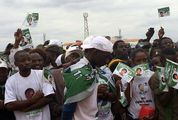ANC has failed to shift economic divide
by David Pilling
2016-08-05 04:35:33.0
THEY call it the spatial divide. Send a drone over SA and it is immediately apparent what the term means. In city after city, town after town, the picture is the same. On one side, a California-dreaming scene of lush green plots, dotted with swimming pools and sprawling bungalow-style housing. On the other, cramped and waterless, thousands of tiny dwellings and corrugated shacks pressed against each other like so many tombstones.
More than two decades after the end of apartheid, the divide between the white areas and the black ones has barely changed. What was previously mandated by law is today determined by forces more familiar: economics.
Of course, there are some black South Africans now able to live in areas that were once the preserve of whites, or coloureds, who came in apartheid’s hideous pecking order somewhere in-between. A few have become rich thanks to their own endeavours or because, in part, they benefited from black empowerment initiatives. Other black South Africans have found well-paid jobs in the private or public sector.
These are the new elites. After 22 years in power, the ANC has failed to budge the Gini coefficient, a measure of inequality. At 0.63, where 0 is perfect equality and 1.0 perfect inequality, the country is among the most unequal on earth, according to the World Bank — worse than Haiti, worse than Brazil. The ANC’s failure to create more opportunity helps explain its steadily eroding popularity among the black majority. Although it is still easily the biggest party, its once seemingly unassailable grip on power is beginning to loosen as this week’s municipal elections are likely to show.
According to figures provided by Moeletsi Mbeki, brother of former president Thabo, only 37,000 black South Africans earn more than $4,300 a month. Those earning more than $820 number 1.25-million in a country of 53-million people. That compares with 705,000 whites, which does not sound too bad until you consider that black South Africans outnumber white ones 10 to 1. Worse are the jobless figures. SA has a rigid labour market as though it were a high-skilled economy. It is not. The result is mass unemployment. There are 8.3-million people of working age with no job.
What could the ANC have done differently? Given the systematic impoverishment of black South Africans — and the systematic enrichment of white ones — there would have been nothing morally wrong with an aggressive campaign of expropriation.
The apartheid system was designed to ensure the economic spoils were divided along racial lines: "Bantu education" was intended to turn blacks, in the phrase of Hendrik Verwoerd, prime minister and engineer of racial segregation, into "hewers of wood and drawers of water".
However, an assault on white farms might simply have led to a collapse in output. Aggressive expropriation could have scared off millions of whites, leaving a shrunken economic pie to cut into smaller slices. Attempts were made to redistribute wealth through tax. Today, only 6-million people pay tax, while about 16-million depend on state support. But those numbers reveal dependence, not opportunity.
The quality of education for most black people is little better than under apartheid.
The ANC’s close relations with unions means the rights of teachers often trump those of children. Misguided teaching methods have left too many young people semi-literate and semi-numerate.
Astonishingly, Zimbabwean children are better educated than their South African counterparts.
The economy is not growing. Even before the commodity slump, growth barely outpaced population expansion. There is a plan, however, drafted four years ago. It is called the National Development Plan 2030. It is official ANC policy. It has never been implemented.
One of its authors summarises the 400-plus page document as a three-cornered agreement. Rich people pay more taxes, the government provides better services (and steals less money) and wages are allowed to fall so that more people can be absorbed into the labour market. It would mean a deal between business, the ANC and the unions.
SA needs millions of manufacturing jobs to bring in the desperate and the unemployed. For that it needs to bulldoze the infrastructural, educational and labour market impediments. It is probably the best-placed country on the continent to bring real economic transformation about. So far it is failing.
© Financial Times 2016
UNEMPLOYMENT: Men sell their skills on the side of the road for jobs such as painting, plumbing, carpentry. Picture: SOWETAN
THEY call it the spatial divide. Send a drone over SA and it is immediately apparent what the term means. In city after city, town after town, the picture is the same. On one side, a California-dreaming scene of lush green plots, dotted with swimming pools and sprawling bungalow-style housing. On the other, cramped and waterless, thousands of tiny dwellings and corrugated shacks pressed against each other like so many tombstones.
More than two decades after the end of apartheid, the divide between the white areas and the black ones has barely changed. What was previously mandated by law is today determined by forces more familiar: economics.
Of course, there are some black South Africans now able to live in areas that were once the preserve of whites, or coloureds, who came in apartheid’s hideous pecking order somewhere in-between. A few have become rich thanks to their own endeavours or because, in part, they benefited from black empowerment initiatives. Other black South Africans have found well-paid jobs in the private or public sector.
These are the new elites. After 22 years in power, the ANC has failed to budge the Gini coefficient, a measure of inequality. At 0.63, where 0 is perfect equality and 1.0 perfect inequality, the country is among the most unequal on earth, according to the World Bank — worse than Haiti, worse than Brazil. The ANC’s failure to create more opportunity helps explain its steadily eroding popularity among the black majority. Although it is still easily the biggest party, its once seemingly unassailable grip on power is beginning to loosen as this week’s municipal elections are likely to show.
According to figures provided by Moeletsi Mbeki, brother of former president Thabo, only 37,000 black South Africans earn more than $4,300 a month. Those earning more than $820 number 1.25-million in a country of 53-million people. That compares with 705,000 whites, which does not sound too bad until you consider that black South Africans outnumber white ones 10 to 1. Worse are the jobless figures. SA has a rigid labour market as though it were a high-skilled economy. It is not. The result is mass unemployment. There are 8.3-million people of working age with no job.
What could the ANC have done differently? Given the systematic impoverishment of black South Africans — and the systematic enrichment of white ones — there would have been nothing morally wrong with an aggressive campaign of expropriation.
The apartheid system was designed to ensure the economic spoils were divided along racial lines: "Bantu education" was intended to turn blacks, in the phrase of Hendrik Verwoerd, prime minister and engineer of racial segregation, into "hewers of wood and drawers of water".
However, an assault on white farms might simply have led to a collapse in output. Aggressive expropriation could have scared off millions of whites, leaving a shrunken economic pie to cut into smaller slices. Attempts were made to redistribute wealth through tax. Today, only 6-million people pay tax, while about 16-million depend on state support. But those numbers reveal dependence, not opportunity.
The quality of education for most black people is little better than under apartheid.
The ANC’s close relations with unions means the rights of teachers often trump those of children. Misguided teaching methods have left too many young people semi-literate and semi-numerate.
Astonishingly, Zimbabwean children are better educated than their South African counterparts.
The economy is not growing. Even before the commodity slump, growth barely outpaced population expansion. There is a plan, however, drafted four years ago. It is called the National Development Plan 2030. It is official ANC policy. It has never been implemented.
One of its authors summarises the 400-plus page document as a three-cornered agreement. Rich people pay more taxes, the government provides better services (and steals less money) and wages are allowed to fall so that more people can be absorbed into the labour market. It would mean a deal between business, the ANC and the unions.
SA needs millions of manufacturing jobs to bring in the desperate and the unemployed. For that it needs to bulldoze the infrastructural, educational and labour market impediments. It is probably the best-placed country on the continent to bring real economic transformation about. So far it is failing.
© Financial Times 2016























